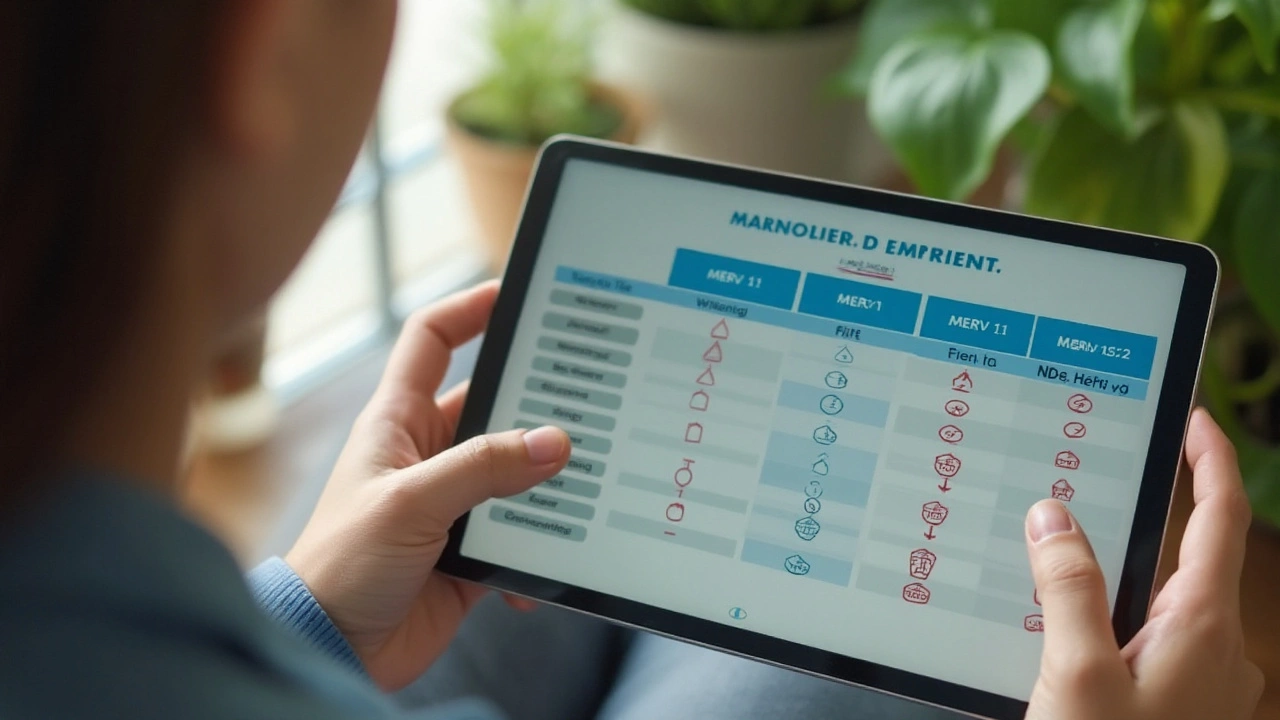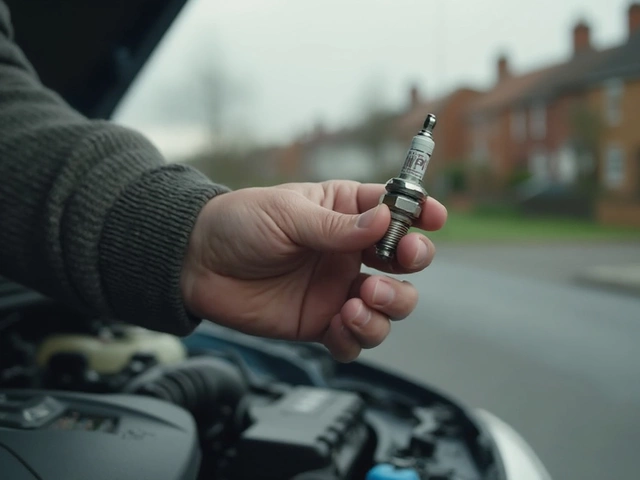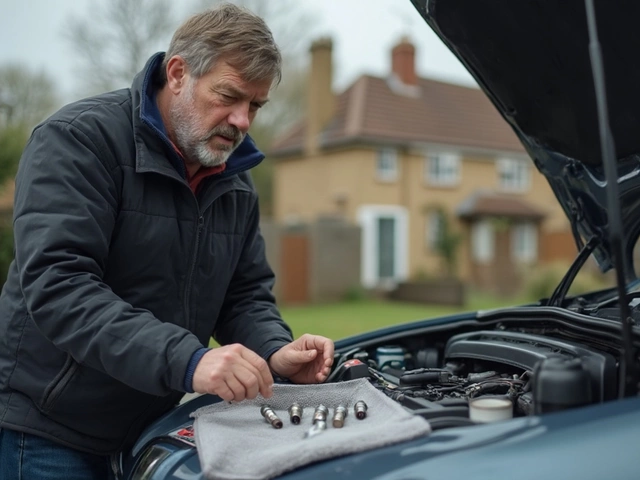When it comes to maintaining a healthy home environment, choosing the right air filter is crucial. MERV, which stands for Minimum Efficiency Reporting Value, is a standard that rates the effectiveness of air filters. This metric can help guide your choice, but it's essential to understand what different MERV ratings mean for your household.
MERV 11 filters, in particular, are known for their ability to trap a significant number of airborne particles. But are they too much for residential use, or just right? By examining the benefits and potential drawbacks of these filters, you can better decide if they make sense for your home. From keeping allergens at bay to ensuring proper airflow, there's more to consider than just the ratings. Dive into the details and find out which air filter will help you breathe easier.
- Understanding MERV Ratings
- Benefits of MERV 11 Filters
- Potential Downsides
- Comparing MERV Ratings
- Tips for Choosing the Right Filter
Understanding MERV Ratings
The MERV rating, which stands for Minimum Efficiency Reporting Value, is a crucial metric devised by the American Society of Heating, Refrigerating, and Air-Conditioning Engineers (ASHRAE) to gauge the efficiency of an air filter. But understanding what a MERV rating truly means is not just important—it's essential. This number signifies the filter's ability to capture particles of different sizes. A lower MERV rating may only capture larger particles, while a higher rating can trap much smaller particles. These include dust, pollen, mold spores, and even some bacteria. For most residential uses, MERV ratings from 1 to 12 typically suffice, capturing common household pollutants while allowing adequate airflow.
MERV ratings range from 1 to 20, with higher numbers indicating a greater ability to capture smaller particles. Filters with ratings between 1 and 4 are often found in basic residential furnaces and air conditioners. They manage to stop large particles such as dust mites or carpet fibers, which is suitable for many households. Ratings between 5 and 8 increase the efficiency, capturing more dust and mold spores, with a wider variety of air filters fitting within this range. Yet, for individuals seeking enhanced air quality, particularly those susceptible to allergies, a MERV 11 or higher may be considered ideal. These can handle small particles such as pet dander, smoke, and microscopic allergen particles.
Interestingly, filters with ratings of MERV 13 and up are typically reserved for medical facilities or cleanrooms, capturing very fine particles, including bacteria and viruses. However, ASHRAE recommendations often state that households focus on selecting the right efficiency for their need. It’s worth noting that filters with very high ratings can sometimes restrict airflow, potentially leading to maintenance issues in home HVAC systems. So, while a MERV 11 might sound appealing, it's the balance between air quality and HVAC performance that often guides homeowners' choices. As Mike Hopkins of the Indoor Air Quality Association expressed,
"It's not about going for the highest rating; it's about finding the right fit for your environment."
When to Opt for Higher MERV Ratings
For households with allergy sufferers, smokers, or pets, choosing a filter with a higher efficiency rating like MERV 11 might indeed be beneficial. These filters are adept at reducing airborne particles that could provoke respiratory issues. If your primary concern is allergies or asthma, a middle-ground MERV 9 to 12 filter can be effective without unduly taxing your HVAC system. It's about understanding the demands unique to your living environment and striking an equilibrium between improved air quality and system efficiency.
Considering these aspects, what’s the overarching idea? It's all about understanding your house's particular needs. Help protect your family’s health and your HVAC system's functionality by familiarizing yourself with air filters. This knowledge will guide your decisions, ensuring a proper buy that enhances your home’s air without overworking your heating and cooling systems.
Benefits of MERV 11 Filters
When considering MERV 11 filters for your home, it's important to weigh the benefits they bring. MERV 11 filters are designed to capture residential pollutants effectively, such as dust, pollen, mold spores, and pet dander. This level of filtration can significantly enhance indoor air quality, particularly in homes with residents who suffer from allergies or respiratory conditions. Improved air quality not only helps to reduce the symptoms of these conditions but can also contribute to better sleep and overall health. One of the key advantages of using a MERV 11 filter in a residential setting is its ability to balance filtration with airflow, ensuring your HVAC system runs efficiently without being overly taxed.
In some instances, users have reported noticing a considerable decrease in the amount of dust settling on surfaces, translating to less frequent cleaning requirements and a fresher home environment. By trapping smaller particles more effectively than lower MERV-rated filters, MERV 11 filters offer a middle ground between basic filtration and high-efficiency options used in medical and commercial settings. According to the American Society of Heating, Refrigerating and Air-Conditioning Engineers (ASHRAE), filters at this level can remove particles as small as one to three microns with a high degree of effectiveness. This balance means that, while they require more power from the HVAC system compared to lower-rated filters, they do not put the same strain as their higher-rated counterparts, thereby extending the lifespan of the equipment.
Some homeowners appreciate the peace of mind they receive from using air filters that significantly reduce the presence of pollutants, particularly in areas with high pollen counts or urban environments with increased pollution levels. Enhanced filtration can also contribute to maintaining the condition and cleanliness of HVAC ducts, which can be a significant factor in prolonging the life of your system. A less common but noteworthy benefit of using MERV 11 filters is their potential for odor reduction. While not specifically designed for this purpose, the ability to trap finer particles can lead to a generally fresher smell indoors, as some odors stem from the very particles these filters help to eliminate.
A guide from the Environmental Protection Agency (EPA) suggests that homeowners consider their specific needs when selecting a filter. Families with pets, smokers, or residents suffering from asthma may find the benefits of MERV 11 filters particularly advantageous. "A good air filter can reduce indoor toxicants and improve respiratory health," states an EPA guide, emphasizing the health implications of choosing the right level of filtration. With cleanliness, health, freshness, and equipment longevity on the line, it's clear why MERV 11 filters capture the attention of many residential users.

Potential Downsides
While a MERV 11 filter can significantly improve your home's air quality, it's important to weigh its potential downsides. One of the primary concerns with higher MERV ratings is the restriction of airflow. A filter that traps more particles could also make your HVAC system work harder, as it has to push air through a more tightly woven fabric. This increased strain could lead to higher energy costs over time and even cause wear and tear on the system components.
Another consideration is if you live in an older home with an HVAC system that's not designed for high-efficiency filtration, a high-rated filter might not be suitable. It can demand too much from an aging system, potentially reducing both the air quality benefit and the longevity of your HVAC unit. It's crucial to ensure that the system can handle MERV 11 filters efficiently. If you're unsure, consulting with a professional could save you from costly repairs down the line.
Maintenance is another factor not to overlook. High-efficiency filters, like MERV 11, need more frequent changes compared to their lower-rated counterparts. Accumulation of particles can rapidly decrease both their efficiency and the overall air quality in your home. It can also exacerbate the problem of restricted air flow. Scheduling regular replacements and check-ins is vital to maintaining the balance between filtration efficiency and system health.
The cost of filters should also be considered. MERV 11 filters can be more expensive upfront than filters with lower ratings. While the aim is improved air quality, the price point should be justified by the specific needs of your household. If there are no significant concerns with allergens or indoor air pollution, the benefits might not outweigh the costs. Applying this practicality ensures you're making a wise investment in your home’s air system.
"For most homes in the U.K., a MERV 8 filter could be adequate, unless specific allergens or air quality issues require a higher rating," according to a report by the Air Filtration Research Institute. Always assess the specific requirements of your living environment before opting for higher-rated filtration.
Moreover, the effectiveness of using a MERV 11 filter can vary based on geographical location and the pollution level indoors and outdoors. Homes in areas with heavy traffic or industrial activities might benefit more compared to rural homes. Recognizing these differences helps you tailor your filtering approach to your needs, ensuring optimal performance and value.
Comparing MERV Ratings
Understanding the differences between various MERV ratings is key to making an informed decision for your home air filtration needs. The MERV rating scale typically ranges from 1 to 20, with higher numbers representing filters that are capable of capturing smaller particles and higher percentages of particulate matter. For instance, MERV 1-4 filters tend to offer the most basic particle filtration, suitable mainly for larger dust particles, while higher-end filters like MERV 13-16 are commonly used in hospitals for catching very fine particles such as bacteria and viruses.
The MERV 11 filter falls somewhere in the middle of this spectrum, making it a popular choice for residential use. It demonstrates a good balance of capturing smaller airborne particles, such as pet dander, pollen, and mold spores, without overly restricting airflow. According to a study conducted by ASHRAE (American Society of Heating, Refrigerating and Air-Conditioning Engineers), filters in the MERV 11 category are efficient in catching particles that range from 1 to 3 microns in size, achieving between 65% to 79% effectiveness at doing so. This makes them ideal for families with allergies or respiratory concerns that still want a relatively affordable solution without moving to HEPA (High-Efficiency Particulate Air) filters, which correspond to MERV ratings 17 and above.
It's crucial, however, to recognize that not every household requires such a high degree of filtration. According to Dr. Richard Corsi, a respected voice in indoor air quality research, “Choosing a more efficient filter doesn’t always translate to better air.” Instead, it’s important to match the filter to your specific living conditions. Factors such as the overall air quality in your area, whether your home is frequently exposed to smoke from wildfires, or if you have multiple pets, can all affect which MERV rating is most suitable for your needs.
It’s worth noting that while more effective at filtration, higher-rated filters like MERV 11 can hinder airflow if your HVAC system isn't powerful enough to handle them. This could potentially increase energy costs or put unnecessary strain on your system. As shown in the table below, which outlines an approximate comparison of pressure drops across different MERV ratings, higher filtration levels could lead to increased airflow resistance, unless the HVAC setup is configured correctly.
| MERV Rating | Pressure Drop (inches of water column) |
|---|---|
| 1-4 | 0.1 |
| 5-8 | 0.2 |
| 9-12 | 0.3 |
| 13-16 | 0.5 |
Ultimately, the goal is to choose a filter that maximizes air quality without compromising on energy efficiency or system operation. Meeting this balance isn't a one-size-fits-all scenario. Consulting with HVAC professionals can provide personalized insights into what MERV rating will work best in maintaining not only healthier air but also a healthier HVAC system. So, whether you're considering a change to MERV 11 or another rating, understanding these details equips you to create a better environment at home.

Tips for Choosing the Right Filter
With so many options available, finding the right air filter for your home can feel like a daunting task. It's important to consider factors such as filter efficiency, home size, and specific air quality needs when making your choice. Begin by assessing the unique characteristics of your living space, including things like the number of occupants, presence of pets, and whether anyone in the home has allergies or asthma. This information can significantly influence which type of filter will be most beneficial for your household.
Before making any decisions, it’s useful to have a strong understanding of MERV ratings and their implications. A MERV 11 filter, for instance, is proficient at capturing smaller particles such as pollen, mold spores, and dust mites, making it an excellent choice for those dealing with allergies. However, while a higher MERV rating means better filtration, it can also result in reduced airflow. Ensuring that your HVAC system is compatible with a higher-rated filter is an essential consideration to keep in mind.
Budget is another critical element to consider. While more efficient filters tend to cost more upfront, they can prolong the life of your HVAC system and improve the air quality, potentially saving money on healthcare costs. It's worth doing a cost-benefit analysis to determine how often you'll need to replace the filter and the long-term costs associated with each option.
Size and structure of the filter matter as well. Homeowners should ensure that the dimensions of the chosen filter match their system requirements to avoid poor performance or inefficiencies. Checking the manufacturer's specifications of your HVAC unit can help you identify the correct size. Some modern filters are designed to be washable and reusable, which can be a more sustainable and cost-effective option in the long run.
A consultation with an HVAC professional can provide personalized advice tailored to your home’s specific needs, as well as valuable insights into the latest technological advancements in air filtration. According to one industry expert, "Investing in a quality air filter is investing in your family's well-being. The right filter not only ensures clean air but also enhances the overall efficiency of your system."
For those trying to make sense of various brand claims, independent reviews and ratings can offer unbiased insights into filter performance. It can be worthwhile to explore online resources and customer feedback before making a purchase.
The following table gives a brief overview of various MERV ratings and their suitability for residential purposes:
| MERV Rating | Captures | Suitable For |
|---|---|---|
| 1-4 | Large particles (e.g., dust mites) | Minimal filtration needs |
| 5-8 | Medium particles (e.g., mold spores) | Standard residential use |
| 9-12 | Finer particles (e.g., pet dander) | Allergy sufferers, pet owners |
| 13-16 | Even finer particles (e.g., bacteria) | Advanced filtration needs |






